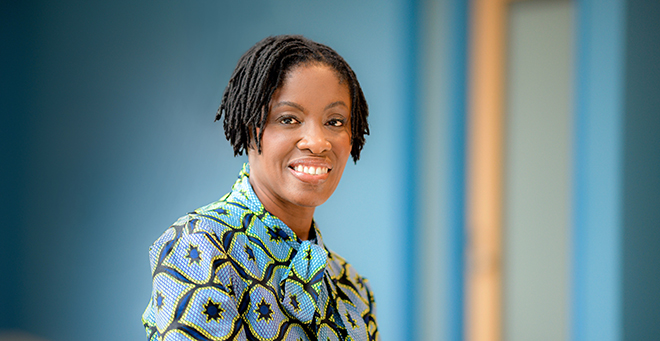Crista Johnson-Agbakwu, MD highlighted in UMass Med Magazine
Date Posted: Tuesday, February 06, 2024Profile: Crista Johnson-Agbakwu, MD

When Crista Johnson-Agbakwu, MD, the inaugural executive director of the UMass Chan Medical School Collaborative in Health Equity, was growing up in Connecticut, she saw few opportunities for Black girls interested in medicine. As a fourth grader, she became intrigued by science, but she said her educational path was blocked by a series of locked doors. In her high school, “they started replacing advanced placement English, calculus and biology classes with woodworking, carpentry, automotive and cooking classes,” because school leaders believed these classes better suited Black students whom they saw as not suited for college, according to Dr. Johnson-Agbakwu. With the help of vigilant and persistent parents involved in the local school system and surrounding immigrant community, a new path emerged. “They were my champions in providing and nurturing me to get into those spaces to be exposed to medicine,” said Johnson-Agbakwu.
Johnson-Agbakwu’s early immersion in pipeline programs carried her on a journey toward earning a bachelor’s degree in biology from Johns Hopkins University, completing medical school at Weill Cornell Medical College and focusing her residency on obstetrics and gynecology at the George Washington University Medical Center.
Before graduating from Johns Hopkins, she received parting words from a mentor, Claudia Thomas, MD, the first female African American orthopedic surgeon in the United States, to “look beyond the work of serving individual patients and instead seek to get a seat at the table where decisions are made that impact entire populations of color.” This concept has stuck with Johnson-Agbakwu throughout her career and served as an anchor for her pursuits.
She has dedicated her life to helping underrepresented and immigrant communities and is a leader in creating successful and scalable models of care for women’s health. Her research into sexual and reproductive health equity for migrant women of color, published in the American Journal of Public Health, produced one of the largest studies in the United States involving newly arrived Somali women with female genital mutilation/cutting.
As the founding director of the Refugee Women’s Health Clinic in Arizona, Johnson- Agbakwu built the first of its kind in the state and largest transformation of care delivery at a large public safety-net teaching hospital when 16,000 newly arriving refugees from more than 70 countries were brought into the health system over 15 years. The patients were welcomed by community health workers with the shared cultural congruence and lived experiences of forced displacement and migration, who were also certified medical interpreters speaking more than 18 different languages.
The key to her success is to always begin by anchoring her work in the community.
“The work at the very core is recognizing our collective humanity and need for respecting those most vulnerable and having radical empathy and cultural humility in terms of how we approach care for the least of these,” she said. “You do that by having an authentic relationship with community that’s nurtured over time. It’s sustained, it’s cultivated and you honor the community’s voice. You make sure they are holding you accountable, you are representing them in an authentic and transparent way, and you are representing your community in your workforce. The team members delivering care, services and outreach must look like the communities they serve.”
She intends to bring the same curiosity and empathy to her role at UMass Chan where she will begin by offering a safe space for the surrounding community to speak freely, reflect and share. “Part of that means reaching the community where they are. The other part is making sure we are intentional in how we are not only representing the community’s voice, but that we are inviting the community to be part of our team,” said Johnson-Agbakwu.
“The work at the very
core is recognizing our collective humanity and need for respecting those most vulnerable and having radical empathy and cultural humility.”
“Whether it’s a clinical care team or a research team, we need to make sure we are at the front, leading these engagements with the community so they can see us and have some kind of identity with us, an authentic connection that’s culturally congruent, linguistically congruent, and informed by the community’s lived experience and voiced concerns.”
Johnson-Agbakwu said she has her eye on the long- term goal of how to support UMass Chan’s health equity work through funding that sustains and supports and infrastructure that invests within communities. She said it is a multipronged approach that looks beyond the health system. The Collaborative in Health Equity will include a community investment fund to support local and global activities; one of the key activities will be a competitive grant program that funds pilot and full projects for members of the collaborative.
By moving back to New England, Johnson- Agbakwu is coming full circle, returning home to address the needs of the community where she grew up. The difference now is that she returns as a leader in her field, a proven change maker and role model who can open locked doors. She hopes to inspire the next generation of young scholars to take the baton and advance the work even further. ■